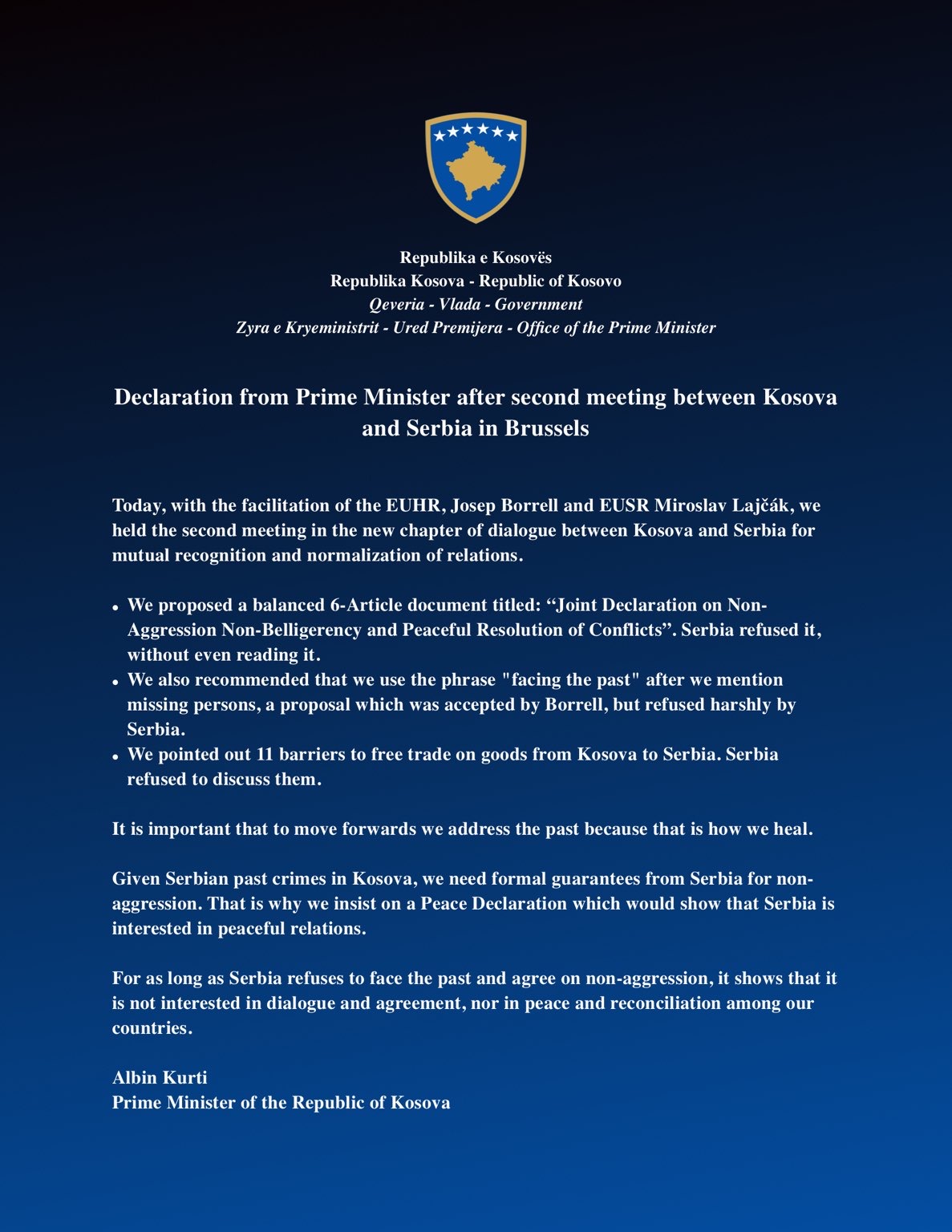Who comes to equity must come with clean hands
Serbian President Vucic, after meeting with Kosovo Prime Minister Kurti yesterday, said:
We have received EU proposals that have been harmonized with our chief negotiators and Serbia has fully agreed with what the EU has proposed, three points – to intensify efforts to identify the remains of missing persons, to refrain from actions that could potentially destabilize the situation…on the ground and third, that the main negotiators meet regularly once a month and prepare meetings when necessary. We could not agree on these three points.
Kurti was rather more graphic:

The lack of agreement is not a surprise. It was foretold. Belgrade and Pristina are into the blame game. Neither Kurti nor Vucic has much to gain politically at home from an agreement. Both are posturing, mainly for their respective domestic political audiences but also for Brussels and Washington.
What can we learn from the posturing? Vucic is taking a minimalist approach. Agreement on missing persons 20 years after the war is no big step. Nor is a proposal on destabilization, because it would apply presumably inside Kosovo, not in Serbia. Meeting once a month is easy too, since it is unlikely given the current atmosphere that more than one or two meetings more will be necessary before Brussels tires of the posturing and lets the schedule slide.
Kurti is taking a maximalist approach, in part to distinguish himself from his predecessors. He regards them as patsies. A non-aggression pact would apply principally to Serbia, as there is no likelihood of Kosovo, which lacks an army, attacking Serbia, which has a big and well-armed one. Facing the past applies to both, but in much larger measure to Serbia, as it was the prime aggressor and human rights abuser in the 1990s conflict. And the barriers to free trade cited are all Serbia’s of course.
I am personally more sympathetic to Kurti’s maximalist agenda than Vucic’s minimalist one, but that doesn’t mean we are likely to see progress. These two are talking past each other, not with each other. The EU mediator, Miroslav Lajcak, is under pressure to produce something, so he may well want to continue the process. But if he does, he needs to underpin it with a more constructive conversation at lower levels, out of the public eye.
My guess is–and it is only a guess–that Belgrade and Pristina could really make some progress on missing people, on protection of Serbs in Kosovo and Albanians in Serbia, and on freeing up trade. Kurti seems intent on threatening to reimpose tariffs on Serbian goods if he gets no satisfaction on access to Serbia’s markets. It’s a good idea only if it leads to lowered barriers. Protection of their respective minorities in the other country is important. There is no excuse for interethnic violence in Kosovo, and in southern Serbia there is a concerted effort to displace the Albanian population through administrative means. Both should stop.
I don’t know what to say that hasn’t already been said about missing people. Twenty years is far too long for governments that claim to be democratic to fail to give a full accounting and return the bodies. I fear that in both countries it is people responsible for the crimes that killed civilians who are now sufficiently powerful to prevent their respective governments from doing what they know is right.
If there is one thing I would prioritize to improve the prospects for the dialogue, it is not at the table in Brussels but before anyone gets there. The day Pristina comes to the table with visible support from Kosovo’s Serb population is the day things will begin to move in a more peaceful, stable direction. Vucic has worked hard to prevent that from happening: he controls the political party that holds all the Serb seats in the Kosovo Assembly. Kurti should be working hard to gain Kosovo Serb support by preventing violence against Serbs and Serb property in Kosovo, ensuring that both are respected fully, and facing Kosovo’s own past, which includes deadly violence by fighters of its Liberation Army against both Serbs and Albanians before, during, and after the 1999 war.
Who comes to equity must come with clean hands. Kosovo can wash its hands a lot easier, and with much greater effect, than Serbia can.




 RSS - Posts
RSS - Posts
